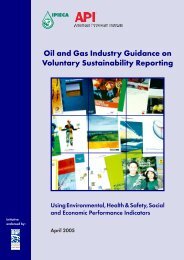Why gender matters - Centre for Social Responsibility in Mining ...
Why gender matters - Centre for Social Responsibility in Mining ...
Why gender matters - Centre for Social Responsibility in Mining ...
Create successful ePaper yourself
Turn your PDF publications into a flip-book with our unique Google optimized e-Paper software.
Section 2 – The rationale <strong>for</strong> <strong>in</strong>tegrat<strong>in</strong>g<br />
<strong>gender</strong> <strong>in</strong>to community work <strong>in</strong> m<strong>in</strong><strong>in</strong>g<br />
For Rio T<strong>in</strong>to, <strong>gender</strong> <strong>matters</strong> <strong>in</strong> order to:<br />
– m<strong>in</strong>imise negative impacts of m<strong>in</strong><strong>in</strong>g;<br />
– ga<strong>in</strong> and ma<strong>in</strong>ta<strong>in</strong> a social licence to operate;<br />
– support local and Indigenous employment opportunities;<br />
– uphold corporate commitments to human rights;<br />
– advance Rio T<strong>in</strong>to’s susta<strong>in</strong>able development objectives; and<br />
– improve access to f<strong>in</strong>ance.<br />
Background reader<br />
M<strong>in</strong>imise negative impacts and<br />
reduce risk to vulnerable groups<br />
Rio T<strong>in</strong>to has a responsibility to<br />
ensure that adverse impacts and<br />
social risks are m<strong>in</strong>imised and do<br />
not fall disproportionately on any<br />
one section of the population.<br />
There is clear evidence that <strong>in</strong><br />
certa<strong>in</strong> contexts women are<br />
particularly vulnerable to m<strong>in</strong><strong>in</strong>g<br />
development. Part 2 – Guidance on<br />
“how to”’ provides some guidance<br />
<strong>for</strong> operations to ensure that<br />
women and men are consulted<br />
and not further marg<strong>in</strong>alised or<br />
adversely impacted by its activities.<br />
This <strong>in</strong>cludes people who are<br />
unable or unwill<strong>in</strong>g to participate<br />
<strong>in</strong> the bus<strong>in</strong>ess of m<strong>in</strong><strong>in</strong>g, or<br />
related activities. Avoid<strong>in</strong>g social<br />
harm and m<strong>in</strong>imis<strong>in</strong>g negative<br />
impacts can also help ensure<br />
a more stable work<strong>for</strong>ce and<br />
community context.<br />
Ga<strong>in</strong> and ma<strong>in</strong>ta<strong>in</strong> a social<br />
licence to operate<br />
Rio T<strong>in</strong>to aims to adequately<br />
consider the perspectives of local<br />
communities, m<strong>in</strong>orities and<br />
marg<strong>in</strong>alised groups, and develop<br />
a social licence to operate.<br />
However, there are groups of<br />
women from around the world<br />
who cont<strong>in</strong>ue to highlight the<br />
fact that m<strong>in</strong><strong>in</strong>g often fails to take<br />
account of women’s perspectives.<br />
Women are us<strong>in</strong>g their agency<br />
and be<strong>in</strong>g supported by powerful<br />
actors such as the World Bank<br />
Group through its Gender Action<br />
Plan and International F<strong>in</strong>ance<br />
Corporation programmes that<br />
target women <strong>in</strong> the extractive<br />
<strong>in</strong>dustry. International NGOs<br />
such as Oxfam Australia have also<br />
supported <strong>in</strong>itiatives such as the<br />
International Women <strong>in</strong> M<strong>in</strong><strong>in</strong>g<br />
Network. Women are <strong>in</strong>creas<strong>in</strong>gly<br />
challeng<strong>in</strong>g the <strong>in</strong>dustry’s social<br />
licence to operate and call<strong>in</strong>g <strong>for</strong><br />
more attention to the <strong>gender</strong>ed<br />
impacts of m<strong>in</strong><strong>in</strong>g.<br />
Engagement with women at all<br />
stages of m<strong>in</strong><strong>in</strong>g development<br />
will enable a greater level of<br />
<strong>in</strong>volvement and ideally a more<br />
robust social licence to operate.<br />
<strong>Social</strong> licence to operate is not<br />
someth<strong>in</strong>g to be taken <strong>for</strong> granted<br />
and it can change over time with<br />
political, economic and stakeholder<br />
relationship circumstances.<br />
Local employment opportunities<br />
The focus of this guide is upon<br />
the work of Rio T<strong>in</strong>to’s<br />
Communities team, but it is<br />
important to recognise the l<strong>in</strong>ks<br />
between community relations<br />
and employment. One of the<br />
most obvious benefits that a<br />
m<strong>in</strong>e can offer is employment,<br />
either directly with the m<strong>in</strong>e or<br />
<strong>in</strong> associated employment, such<br />
as bus<strong>in</strong>esses that service the<br />
m<strong>in</strong>e. A common expectation<br />
is that m<strong>in</strong><strong>in</strong>g will br<strong>in</strong>g<br />
employment, and lack of<br />
equitable employment <strong>for</strong> local<br />
and Indigenous people (and<br />
particularly women <strong>in</strong> these<br />
groups) can become a po<strong>in</strong>t of<br />
tension between companies and<br />
communities. Local employment<br />
needs to be sensitively managed<br />
to give women equal opportunity<br />
to access employment.<br />
Beyond this, the <strong>in</strong>dustry’s ability<br />
to address issues such as pay<br />
disparities, attract<strong>in</strong>g women<br />
to non-traditional careers and<br />
address<strong>in</strong>g m<strong>in</strong><strong>in</strong>g’s “old school”<br />
image are <strong>in</strong>creas<strong>in</strong>gly important.<br />
Rio T<strong>in</strong>to’s broader diversity<br />
strategy addresses some of these<br />
employment considerations.<br />
81



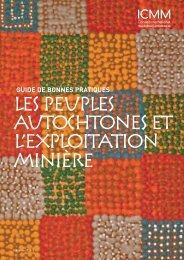
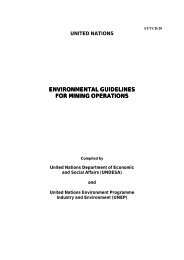
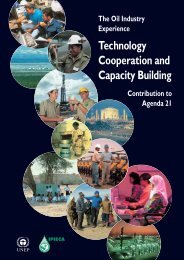
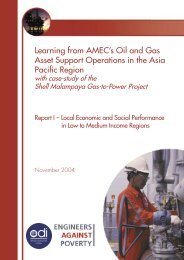
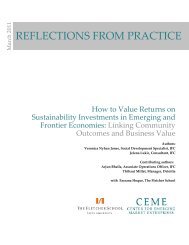
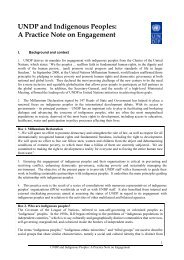
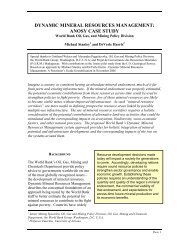
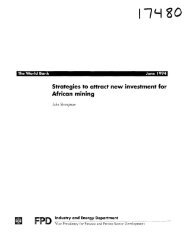
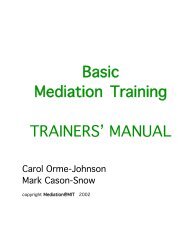
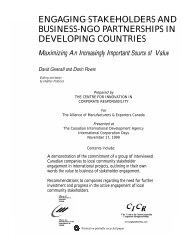
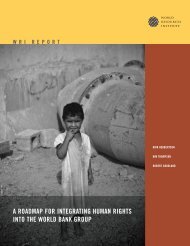
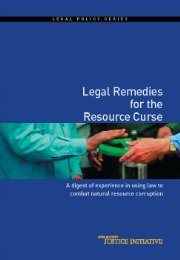
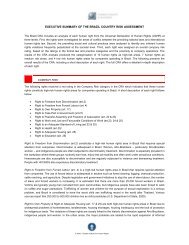
![[PDF] Community Development Toolkit - CommDev](https://img.yumpu.com/48616495/1/184x260/pdf-community-development-toolkit-commdev.jpg?quality=85)
